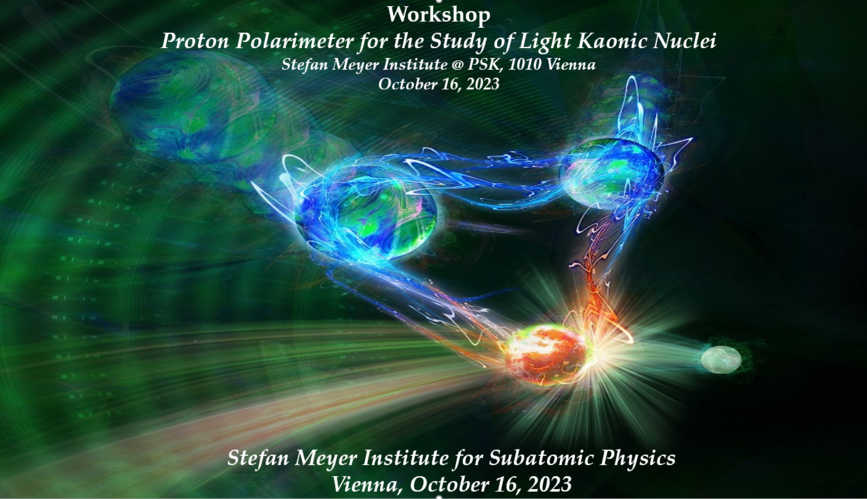Workshop: Proton Polarimeter for the Study of Light Kaonic Nuclei
at our new location at PSK . Participants were Masa IWASAKI, Fuminori SAKUMA, Takumi YAMAGA, Tadashi HASHIMOTO, Takuya NANAMURA, Jerzy SMYRSKI, Florin SIRGHI, Johann MARTON and Johann ZMESKAL. Thanks for coming and the interesting discussions!

The study of the antikaon-nucleon interaction is one of the most important subjects to understand meson-baryon interactions in low energy quantum chromodynamics (QCD). Extensive measurements of anti-kaonic hydrogen atoms [1–3] and low-energy anti-kaon hydrogen scattering [4] have revealed the strongly attractive nature of the anti-kaon nucleon interaction. The possible existence of deeply-bound anti-kaonic nuclei states has been widely discussed [5–13]. Anti-kaonic nuclei are predicted to be compact due to the strong anti-kaon nucleon attraction, suggesting that a new form of high-density nuclear matter is realized in anti-kaonic nuclei systems.
Among the kaonic nuclei, the anti-kaon nucleon system (K−pp) is of special interest, because it is the lightest S = −1 anti-kaon nucleus whose existence is supported by many theoretical works today. Despite considerable experimental efforts over the past 20 years, the clear prove of the existence of K−pp was a challenging task. Finally, the “E15” experiment [14] at J-PARC confirmed the existence of a K−pp bound state by using the in-flight K− + 3He ® K−pp + n reaction. A distinct peak structure was observed well below the K- + p + p mass threshold in the Λp invariant-mass (IM) spectrum, interpreting that K−pp is a bound system which decays into Lp.
Due to the excellent result of “E15”, an improved apparatus is now under construction and a proposal for an extended experimental programme “E80” is put forward to the J-PARC Programme Advisory Committee. Detailed and systematic studies are planned from the simplest system K−p [º L(1405)] to be expanded to multi-nucleon systems like K−NNNN and double kaon systems like K−K−NN.
In addition, the spin and parity of the K-NN state should be determined, an important information to reveal the structure of anti-kaon bound systems, using a dedicated polarimeter detector setup.
References
[1] M. Iwasaki et al. Phys. Rev. Lett. 78 (1997) 3067.
[2] G. Beer et al. Phys. Rev. Lett. 94 (2005) 212302.
[3] M. Bazzi et al. Phys. Lett. B704 (2011) 113.
[4] A. D. Martin Nucl. Phys. B179 (1981) 33.
[5] Y. Nogami Phys. Lett. 7 (1963) 288.
[6] T. Yamazaki and Y. Akaishi Phys. Lett. B535 (2002) 70.
[7] N. V. Shevchenko, A. Gal, and J. Mares Phys. Rev. Lett. 98 (2007) 082301.
[8] Y. Ikeda and T. Sato Phys. Rev. C76 (2007) 035203.
[9] S. Wycech and A. M. Green Phys. Rev. C79 (2009) 014001.
[10] A. Dote, T. Hyodo, and W. Weise Phys. Rev. C79 (2009) 014003.
[11] T. Sekihara, E. Oset, and A. Ramos Prog. Theor. Exp. Phys. 2016 (2016) 123D03.
[12] S. Ohnishi, W. Horiuchi, T. Hoshino, K. Miyahara, and T. Hyodo Phys. Rev. C95 (2017) 065202.
[13] A. Dote, T. Inoue, and T. Myo Phys. Lett. B784 (2018) 405.
[14] E15 collaboration, M. Iwasaki et al. Phys. Lett. B789 (2019) 620–625.
Timetable:
10:00 Welcome
(10 min.) J. Zmeskal
10:10 Results and prospects of kaonic nuclei at J-PARC
(20 min.) F. Sakuma
10:30 Proton polarimeter for determination of spin & parity
of KbarNN
(30 min.) T. Yamaga
11:00 Straw tube detectors for PANDA
(30 min.) J. Smyrski
11:30 Coffee break
11:45 Discussion - Towards a Polarimeter for E80
(90 min.)
13:15 Lunch
14:00 Experimental study of the state KbarNNN and beyond
at J-PARC
(45 min.) T. Hashimoto
14:45 Development of large acceptance spectrometer for systematic study of kaonic nuclei at J-PARC
(45 min.) T. Nanamura
15:30 Coffee break
(15 min.)
15:45 Final Discussion
(45 min.)